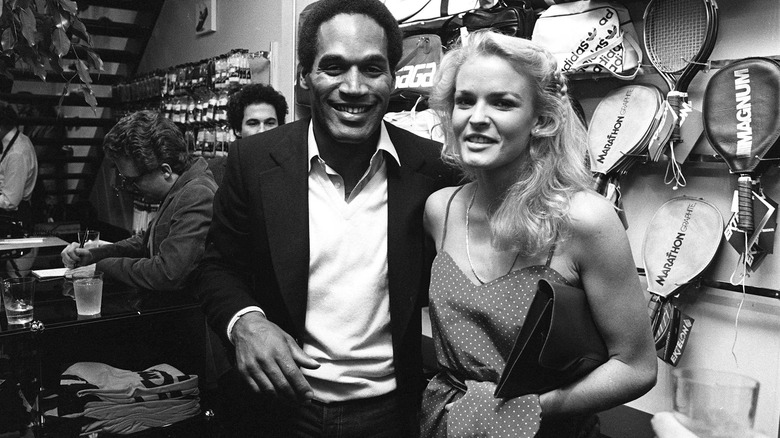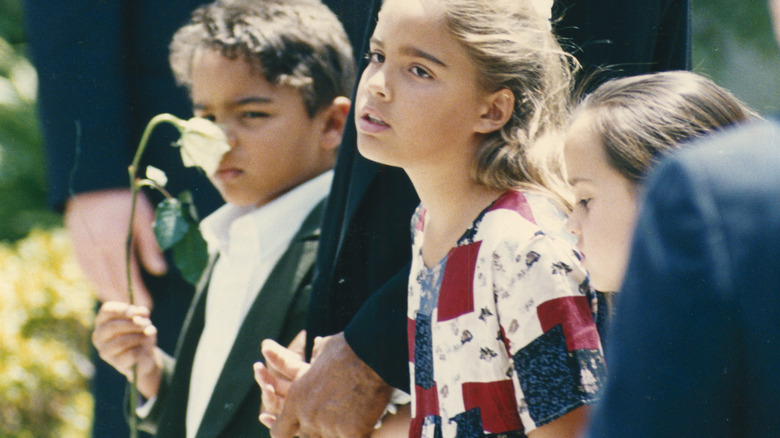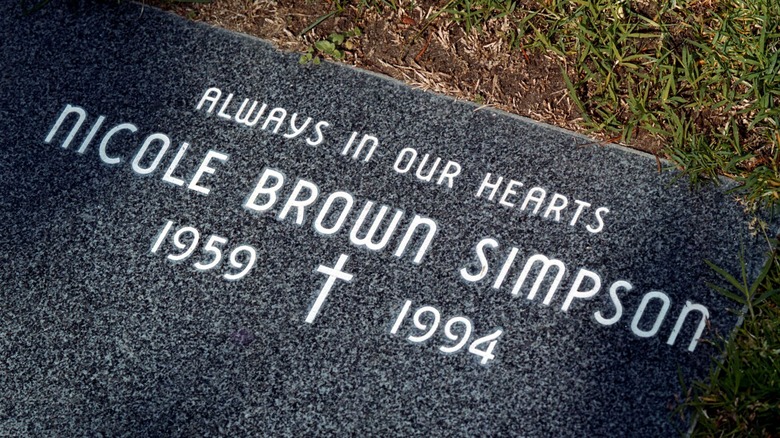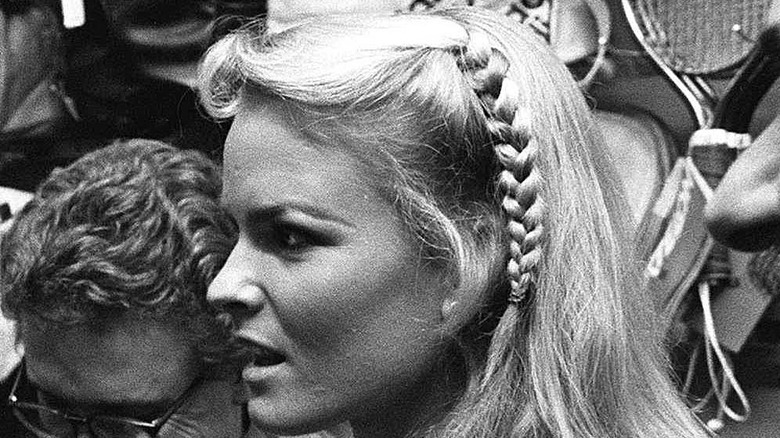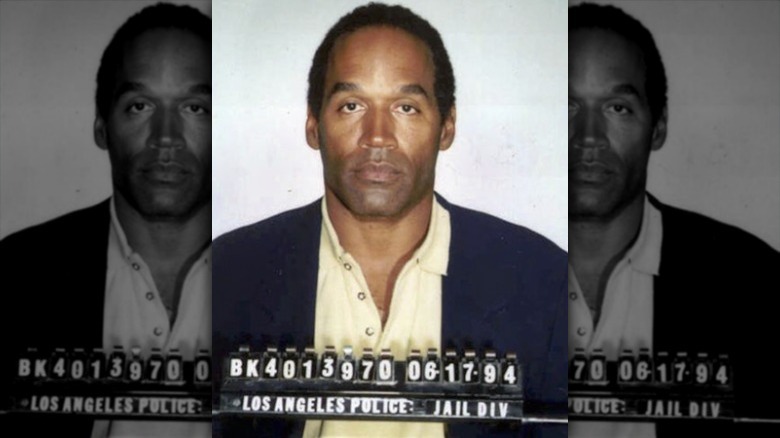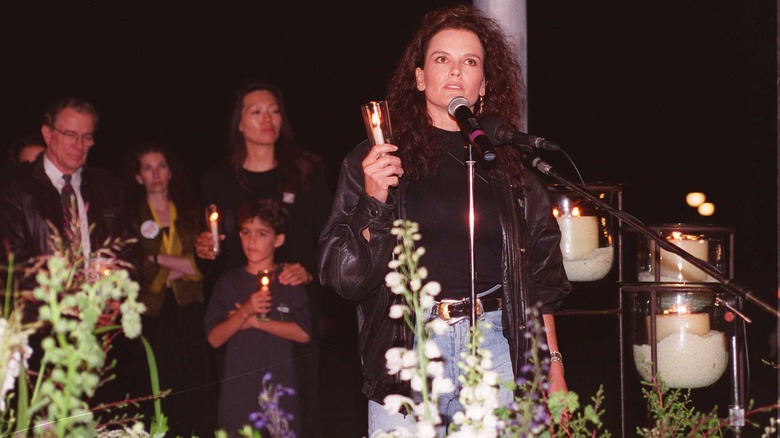Chilling Details About Nicole Brown Simpson's Murder
The events of June 12, 1994 shocked the nation. That, says History, is when Nicole Brown Simpson and her friend Ron Goldman were brutally murdered at her Brentwood home. The murder — and the following trial — dominated headlines and the news cycle for months, and as terrible as the killings were, it's entirely possible that they wouldn't have gotten the attention they did if her ex-husband wasn't former football player and entertainment personality O.J. Simpson.
It wasn't long before Simpson emerged as the prime suspect, and the deck was pretty stacked against him. In addition to having no alibi, there was the infamous chase in the white Ford Bronco, and Nicole's blood was found at his home, not only on the also-infamous leather glove, but on socks as well. Five days after the murder, Simpson was arrested and charged.
It's estimated that somewhere around 140 million people tuned in to hear the verdict: After the 252-day-long trial, it took the jury just four hours to return with their ruling that Simpson wasn't guilty. Simpson was, however, found guilty of charges adjacent to the murders in a 1997 civil trial, and it was ruled that he owed $33.5 million to the families of his ex-wife and Goldman. In the meantime, the sensationalism surrounding the trial and Simpson's fame overshadowed the murders themselves — and there were some awful details that may have been forgotten.
Her dog alerted neighbors
There's nothing quite as exquisite as the love of a dog, and on the June night in 1994, it was the howling of a dog that first alerted neighbors to the fact that something terribly wrong had happened.
Neighbors all heard the dog, reported the Associated Press: Paul Fenjves recalled the haunting sound of the melancholy howl, while Steven Schwab took a post-"Dick Van Dyke Show," pre-"Mary Tyler Moore Show" break to walk his own dog. Schwab came across the white Akita, and saw that the dog was splattered with blood. He decided to take the dog home until it could be handed over to a shelter, but the Akita was clearly in distress. The mournful cries continued, and Schwab's neighbor — also summoned by the dog's wails — decided to take the dog and walk it back in the direction it had come from.
He allowed the dog to lead him, and it did — up the path to a condo, where Sukru Boztepe saw the blood and the body of Nicole Brown Simpson. A local veterinarian, Dr. James Isaacs, explained: "The Akita is absolutely a family dog and ... If it was a witness to the act of violence it would be a dog that would seek help. ... When you hear it crying that's what it's doing — crying. It's going through emotional pain." Later, the Los Angeles Times reported that the dog's actions allowed authorities to pinpoint the time of the murders.
One single detail revealed that she had been killed first
The courtroom, reported The Washington Post, was entirely uncomfortable on the day that they were shown photos of the crime scene and read descriptions from the coroner's findings. Highlighting the brutality of the killings was necessary to establish the idea that the murders had been committed in a fit of jealous rage. Los Angeles County Coroner Lakshmanan Sathyavagiswaran testified that Nicole Brown Simpson had been lying on the ground, unable to fight back against an attacker that stood over her, as her throat was cut with such force that the knife sliced into her spine (also corroborated in the autopsy report).
The New York Times says that prosecutors were also able to make strong cases for a few other things based on the state of the bodies. Although Nicole was covered in blood, her feet were clean, which led to Detective Tom Lange concluding that she had been killed first, and that she had been restrained as it happened: "It would indicate to me that the victim was more than likely struck before there was any blood that flowed, and perhaps went down initially before a fight really ensued with the other victim."
Law enforcement testified that Ron Goldman, on the other hand, fought back. Marks in the dirt around his body — and the fact that his shirt was pulled up — seemed to indicate a struggle that took place immediately after Nicole was killed. Nicole was stabbed a total of 12 times, while Goldman was stabbed 25 times (via PennLive).
Her children were asleep in the house when she was killed
According to the Associated Press' timeline of Nicole Brown Simpson's murder and the following court case, the night started with her daughter's dance recital. E! News confirms that her children — Sydney and Justin — were just eight and five years old (respectively) when she was killed at their home, and had their dog not alerted neighbors and dragged them to what would become a bustling crime scene, it's entirely possible they would have discovered the bodies of their mother and her friend, Ron Goldman.
PennLive says that when law enforcement first responded to the call from neighbors, they found a tranquil scene inside the home. She had drawn a bath and made a bowl of ice cream, and the television was on. Her children were sound asleep in their respective bedrooms, unaware of what had happened just outside their doorstep.
Nicole's family has spoken about the struggle to protect the children from the media circus that followed, and their attempts at helping them live as normal a life as possible.
Nicole Brown Simpson told police that her husband was going to kill her
Regardless of whether one thinks O.J. Simpson was guilty or innocent, there's no denying that Nicole Brown Simpson's murder brought a chilling history to light. During O.J.'s trial, prosecutors pointed to an incident that happened on January 1, 1989: When police arrived at the Simpson home, Nicole had injuries so extensive that she was taken to the hospital for treatment. The official police report quoted her as saying, "He's going to kill me! He's going to kill me!"
According to The New York Times, it was the ninth time officers had responded to domestic violence-related calls at the home, and four months after the call, O.J. was sentenced to two years' probation, 120 hours of community service, a $200 fine, and a court-ordered $500 donation to a women's shelter. That sentence was in spite of what Deputy City Attorney Robert Pingle later said he advised, which was a 30-day jail sentence and enrollment in a year-long program on domestic abuse.
Officers recounted Nicole as saying, "You never do anything about him. You talk to him and then you leave. I want him arrested. I want him out so I can get my kids." When questions were raised about whether or not O.J had gotten preferential treatment because of his fame, Lucy Friedman of New York City's Victim Services said that jail sentences for domestic battery were rare: "It's still not considered as serious a crime as battering on the street," she explained.
There were early warning signs of an abusive relationship
Nicole Brown Simpson's death came about two years after she left and divorced O.J. Simpson. They had been married for about seven years, says History, and in the middle of their time together, O.J. had been charged with spousal battery.
According to the National Domestic Violence Hotline, their relationship had started with oft-overlooked warning signs that suggested not everything was going to be smooth sailing. That, they say, included a courtship that progressed very, very quickly, in which Nicole was showered with gifts that O.J. often talked about: The hotline says that a new partner might be more willing to accept or overlook hints of abusive behavior if they're also being treated as if they are being put on a pedestal.
There were also reports of intimidation, and the hotline cites one incident where police were called after O.J. smashed her car's windshield with a baseball bat. In the Fox television special, "O.J. Simpson: The Lost Confession?" domestic violence commentator, Rita Smith points out: "Subtle, and not so subtle, forms of violence are used to continue to keep control over their victim. So him just bouncing the bat off the tire, initially, was a subtle message: I am in charge. I will determine the framework for this relationship." O.J. recalled the incident and indicated there was nothing wrong with what happened: "I mean, it's my car, I paid for it, I said, 'I pay for everything around here.'"
There were numerous reports that she was being stalked
During O.J. Simpson's trial for the murder of his ex-wife Nicole Brown Simpson, prosecutors decided that they needed to establish a motive. When they started interviewing those who knew Nicole, they uncovered what they presented as a pattern of stalking and harassment in the months and years leading up to her death.
One of the most intriguing testimonies came from Keith Zlomsowitch, a name that might not be instantly recognizable, but that is forever tied to the tragic events of that 1994 night. Zlomsowitch was — in addition to having dated Nicole — the owner of the restaurant that she had eaten dinner at on the night of her death, and the employer of Ron Goldman. Zlomsowitch testified to a series of incidents where he said O.J. had spied on them, kicked the door of her house in, and issued some pretty serious threats (via the Dayton Daily News) — and, it was Zlomsowitch who asked Goldman to drop off a pair of sunglasses that she'd left behind.
Los Angeles police officer Ron Shipp was in a bit of a unique position: Not only was he a friend of the Simpsons, but he was also one of the responding officers to her phone calls to the police. He told Vanity Fair that she had told him she was being stalked, and recalled, "The Juice peeking through a window? Come on! I didn't see that happening. ... I gave this guy so much leeway."
A friend tried to get her to leave the country just before her death
Faye Resnick is now one of "The Real Housewives of Beverly Hills," and in the early 1990s, she was a friend of both Nicole Brown Simpson and O.J. Simpson. Just a few months after Nicole's murder, the release of her book, "Nicole Brown Simpson: The Private Diary of a Life Interrupted" brought the trial to a halt as it was debated whether or not the contents would have an influence (it also stopped Resnick from being called as a witness). Still, Vulture says that the book — described as "tawdry and tragic" — reads, in part, as troublingly honest. That's particularly evident in the places where Resnick not only accuses O.J. of some manipulative behavior, but seems to reveal some of her own, including an incident where she asks Nicole not to leave O.J. until after a party she was planning.
Resnick, reported the Associated Press, said that she had called Nicole just a few hours before her death. She also said that a few days prior, she had told Nicole that she was afraid that she was going to die. She recalled telling her, "Please, let's just get out of here. Let's go to Europe," only to have Nicole tell her that the drugs she was taking were making her paranoid. Needless to say, Nicole didn't go to Europe, and on the night she was murdered, Resnick was in an addiction treatment facility.
She reached out for help five days before she was killed
In 1996, O.J. Simpson was in the middle of a civil trial surrounding the death of ex-wife Nicole Brown Simpson, and The New York Times reported that a bombshell bit of testimony — that hadn't been allowed to be presented at his criminal trial — had been relayed to the courtroom in this civil case.
It centered around Nancy Ney, a volunteer at a battered women's shelter called the Sojourn House. She testified that five days before Nicole was murdered, a woman had called the shelter to say that she feared for her life. Although she didn't tell workers her last name, she said that she had been married to someone famous, that he had hit and abused her previously, and that he had threatened to kill her.
Ney further said that the caller — who did give her name as Nicole — said that she was being stalked and harassed. "She said that he had told her a few different times that if he ever caught her with another man he would kill her," Ney testified. According to The Washington Post, the testimony was condemned as hearsay in the trial, but they did note that other details lined up, including the caller's age, location, and the fact that she spoke of having a young son and daughter. "After I heard about the murders, I thought the details sounded familiar, and I went back and found my [call] sheets," Ney testified.
Her diaries documented instances of abuse
The year 2020 was a lot of things, including the 25th anniversary of the not guilty verdict in O.J. Simpson's criminal trial. On that occasion, Investigation Discovery aired "O.J. and Nicole: An American Tragedy," with one of the major reveals of the show being Nicole's diaries. Her sister, Tanya Brown, was quoted (via the Daily Mail) as saying, "Maybe she knew this was her destiny, and maybe subconsciously, she knew something was going to happen. Maybe that's why she kept real detailed diary entries."
The diaries, it was revealed, were discovered in a safe deposit box along with photographic evidence of the various injuries her family says were sustained in the attacks she wrote about. The first entry went all the way back to 1978, and she wrote, "1st time he beat me up ... Threw me on the floor, hit me, kicked me. We went to the hotel where he continued to beat me for hours and I continued crawling for the door."
She also wrote about other incidents that sent her to the hospital, and she detailed pretending that she was in an accident of one sort or another. In another entry, she wrote that he had pulled a gun on her and demanded she have an abortion. The diaries weren't allowed to be entered as evidence during the murder trial, as it was ruled they were hearsay and not admissible.
Those who knew her best felt like her story was lost
It's no secret that in many cases, the names of the victims get overlooked and buried behind the names of accused killers. And that, says some of Nicole Brown Simpson's closest friends and family, is the second part of the tragedy. As her friend Cynthia Shahian told the Los Angeles Times, "I feel that Nicole has gotten lost in all this."
Even as the criminal court case of O.J. Simpson dragged on, she was portrayed as a victim of domestic abuse and, ultimately, of murder. But those who knew her best (including her sister, Denise, pictured) argued that so much more was lost in the courtroom. They knew a Nicole who had spent all of her adult life in a celebrity relationship — the couple met when she was 18 years old — and they also knew that she had been determined to break away from that and forge her own path.
They knew a Nicole who was "bubbly, always happy and smiling," according to her former teacher Bill Prestridge. Those who knew her described a girl who was ready to get out of high school, who wanted to do big things, and for a time, all appearances seemed to be one of a happy and loving — if not old-fashioned — relationship. However, one friend was quoted as saying, "The truth is, no one really knew her during her marriage. ... She was never free to be herself or [to] have friends."
It took her death to start a public conversation about domestic violence
While no killer ever served jail time for the murders of Nicole Brown Simpson and Ron Goldman, something else did happen: It put domestic violence on the nation's radar as an issue that wasn't just something that lurked behind closed doors anymore. American University professor Rachel Louise Snyder said in her book "No Visible Bruises: What We Don't Know About Domestic Violence Can Kill Us" (via VOA News) that, "Her murder hurled into the forefront a conversation that advocates had been having for years — that it could happen anywhere, to anyone."
The statistics from a 2018 Violence Policy Center report were pretty staggering. It's estimated that one in four women will be victims of domestic violence. The numbers were just as shocking for men, with one in nine also being victims.
Nicole Brown Simpson's death and ultimately her letters, diaries, and photographs opened up a conversation about domestic violence. In some cases, it was in the context of Nicole's death that people heard the term "domestic violence" for the first time, and that's true for Katie Ray-Jones, who People notes went on to become the CEO of the National Domestic Violence Hotline. On the heels of the trial came the Violence Against Women Act, and Ray-Jones described the case as "exposure into this world of abuse, specifically physical abuse and emotional abuse, and that controlling behavior that we all started hearing about as the trial unfolded."
If you or someone you know is dealing with domestic abuse, you can call the National Domestic Violence Hotline at 1−800−799−7233. You can also find more information, resources, and support at their website.

